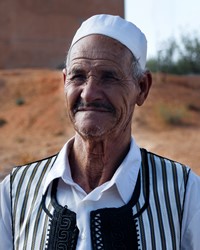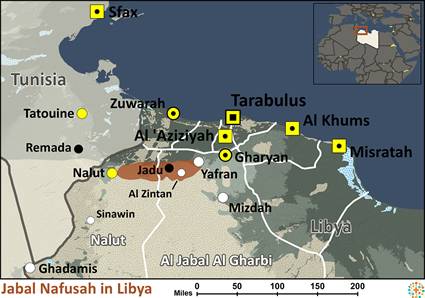Little is known of Libya's earliest inhabitants. However, experts generally agree that they were related to the Berbers who now inhabit the coastal Mediterranean countries to the west. In Morocco and Algeria, Berbers form a large part of the total populations, whereas few Berbers are allowed to live in Libya. As the Arabs overran the region, the Berbers were forced to leave the more prosperous regions. In other places, the Berbers have assimilated into the Arab population.
Lying southwest of Tripoli, the rocky Jebel Nefusa Plateau rises to an elevation of about 3,000 feet. It consists primarily of limestone formations with traces of ancient volcanic activity. One of the most striking features is the steep chalk cliffs that extend from the Tunisian border to the Mediterranean's southern shore. Today, some Berbers live among the plateaus and hills of the Jebel Nefusa, as well as in the Oasis of Fezzan in southwest Libya.
Built with an eye on defense, Nefusa villages are often difficult to reach. Many villages have less than 500 people, but some have more than 1,000 inhabitants. There is little industrial activity in the villages. Although the Nefusa have oil presses, these are small and primitive and only active a few months of the year.
A unique aspect of the villages is the famous troglodyte houses. These are underground homes carved vertically or horizontally into the soft limestone and marls (a mixture of clay, sand, and limestone). Some of the homes resemble simple caves cut into the hill slopes. Others are dug deep into the ground with a complex network of rooms positioned around a central pit that serves as a light source.
The greater part of the country is arid and unproductive; however, over the years the Nefusa have become an agricultural economy well adapted to their semi-arid environment. They grow a variety of crops and raise sheep and goats. For the Nefusa, the size of the farm is not expressed by the amount of land, but by the number of trees. It is not unusual for individual trees to be owned by several families, or for one person to own a tree and another to own the soil in which it grows.
Some of their food sources include olives, figs, and palm trees. There are large plantations of olive trees and figs in the more humid eastern regions. Following the autumn rains, the Nefusa also plant wheat and barley in the neighboring plains. In order to use water and soil resources more efficiently, the Nefusa have built hundreds of soil and stone dams.
For many years, the tribe was the basis of society in Libya. Nine out of ten people lived in tribal domains. Libya's tribal organization persisted in spite of three centuries of various rulers.
Although most Libyans are Sunni Muslims, the Nefusa belong to a tiny Islamic sect called Ibadaya (an off-shoot of Kharijism). Ibadaya originated in the seventh century when disputes arose concerning how religious leaders should be chosen. The Ibadis withdrew from mainstream Islam and relocated in several other countries. Ibadism was received enthusiastically in several northwestern African countries as a vehicle for opposing the Sunni (orthodox) Muslims and the Arab conquerors.
While the Ibadis observe many fundamental Islamic practices, some of their customs are quite unorthodox. For example, the village mosque does not face east towards Mecca.
Like all peoples in Libya, the Nefusa Berbers need a peaceful and safe place to raise their children.
Pray for the Lord to send dreams and visions to Nefusa Berber family leaders.
Ask God to provide evangelistic tools and equipment needed to reach them both spiritually and geographically.
Pray that God will open the hearts of Libya's governmental leaders to the gospel.
Ask the Lord to raise up Nefusa Berber fellowships that will plant more fellowships.
Scripture Prayers for the Berber, Jabal Nafusah in Libya.
https://en.wikipedia.org/wiki/Nafusa_Mountains
https://www.britannica.com/place/Nafusah-Plateau
https://www.jstor.org/stable/jj.4350570.8
| Profile Source: Joshua Project |

























